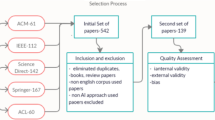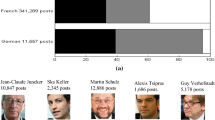Abstract
Online assessment systems are increasingly utilised as an evaluation tool for measuring the performance of lecturers in Institutions of Higher Learning (IHLs). These systems commonly have a set of questionnaires comprised of quantitative and qualitative questions. Most online lecturer teaching assessment systems are focused on the quantitative part of the questionnaire since it is easy to analyse. On the contrary, the qualitative part, which requires students’ opinions, is often omitted and neglected, and the level of opinion results are excluded. This is because students’ opinions are usually in the form of unstructured texts, which makes it hard to manually analyse all the feedback. To address this problem, a system that could automatically analyse students’ feedback (known as OMFeedback) was developed. This system applies an opinion mining technique to reveal the teaching assessment results, which are underpinned by a lexicon-based approach. Lexicon-based is a common textual data quantification method that can analyse the sentiment tendency of a student’s feedback. A database of English sentiment words, known as the Vader Lexicon, was utilised as a lexical source to determine the polarity of words. By analysing these sentiment words, which included intensifier words extracted from students’ feedback, this system was able to determine the results for the lecturer teaching assessment by describing the level of positive, negative, or neutral opinions. This system was also able to process new features, such as capitalised words and emoji characters to enhance the opinion results. Ultimately, this newly developed system will provide useful information to IHLs for improving lecturers’ teaching skills and course materials.



Similar content being viewed by others
References
Abdulla, M. H. (2018). The use of an online student response system to support learning of physiology during lectures to medical students. Education and Information Technologies, 23(6), 2931–2946.
Aung, K. Z., & Myo, N. N. (2017). Sentiment analysis of students’ comment using lexicon based approach. In 2017 IEEE/ACIS 16th international conference on computer and information science (ICIS) (pp. 149–154).
Balachandran, L., & Kirupananda, A. (2017). Online reviews evaluation system for higher education institution: An aspect based sentiment analysis tool. In 2017 11th international conference on software, knowledge, information management and applications (SKIMA) (pp. 1–7).
Balahadia, F. F., Fernando, M. C. G., & Juanatas, I. C. (2016). Teacher’s performance evaluation tool using opinion mining with sentiment analysis. In 2016 IEEE region 10 symposium (TENSYMP) (pp. 95–98).
Barron-Estrada, M. L., Zatarain-Cabada, R., Oramas-Bustillos, R., & Gonzalez-Hernandez, F. (2017). Sentiment analysis in an affective intelligent tutoring system. In 2017 IEEE 17th international conference on advanced learning technologies (ICALT) (pp. 394–397).
Binali, H. H., Wu, C., & Potdar, V. (2009). A new significant area: Emotion detection in E-learning using opinion mining techniques. In 2009 3rd IEEE international conference on digital ecosystems and technologies (pp. 259–264).
Dhanalakshmi, V., Bino, D., & Saravanan, A. M. (2016). Opinion mining from student feedback data using supervised learning algorithms. In 2016 3rd MEC international conference on big data and smart city (ICBDSC) (pp. 1–5).
Hutto, C. J., & Gilbert, E. (2014). VADER: A parsimonious rule-based model for sentiment analysis of social media text. In Proceedings of the eighth international AAAI conference on weblogs and social media (p. 10).
Khan, S., & Khan, R. A. (2019). Online assessments: Exploring perspectives of university students. Education and Information Technologies, 24(1), 661–677.
Nasim, Z., Rajput, Q., & Haider, S. (2017). Sentiment analysis of student feedback using machine learning and lexicon based approaches. In 2017 international conference on research and innovation in information systems (ICRIIS) (pp. 1–6).
Nitin, G. I., Swapna, G., & Shankararaman, V. (2015). Analyzing educational comments for topics and sentiments: A text analytics approach. In 2015 IEEE frontiers in education conference (FIE) (pp. 1–9).
Pong-Inwong, C., & Kaewmak, K. (2016). Improved sentiment analysis for teaching evaluation using feature selection and voting ensemble learning integration. In 2016 2nd IEEE international conference on computer and communications (ICCC) (pp. 1222–1225).
Shiha, M. O., & Ayvaz, S. (2017). The effects of emoji in sentiment analysis. International Journal of Computer and Electrical Engineering, 9(1), 360–369.
Song, S., Kawamura, H., Uchida, J., & Saito, H. (2019). Determining tourist satisfaction from travel reviews. Information Technology & Tourism.
Soong, H.-C., Jalil, N. B. A., Kumar Ayyasamy, R., & Akbar, R. (2019). The essential of sentiment analysis and opinion mining in social media: Introduction and survey of the recent approaches and techniques. In 2019 IEEE 9th symposium on computer applications & industrial electronics (ISCAIE) (pp. 272–277).
Tseng, C.-W., Chou, J.-J., & Tsai, Y.-C. (2018). Text mining analysis of teaching evaluation questionnaires for the selection of outstanding teaching faculty members. IEEE Access, 6, 72870–72879.
Acknowledgements
The authors would like to acknowledge the Universiti Pertahanan Nasional Malaysia (UPNM) and the Ministry of Higher Education Malaysia for being supporters of this work. We also acknowledge the participation and cooperation received from the undergraduate students in UPNM.
Author information
Authors and Affiliations
Corresponding author
Additional information
Publisher’s note
Springer Nature remains neutral with regard to jurisdictional claims in published maps and institutional affiliations.
Rights and permissions
About this article
Cite this article
Wook, M., Razali, N.A.M., Ramli, S. et al. Opinion mining technique for developing student feedback analysis system using lexicon-based approach (OMFeedback). Educ Inf Technol 25, 2549–2560 (2020). https://doi.org/10.1007/s10639-019-10073-7
Received:
Accepted:
Published:
Issue Date:
DOI: https://doi.org/10.1007/s10639-019-10073-7




